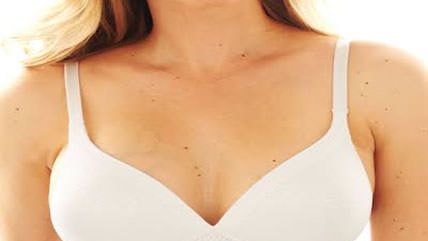Florida City Cops Told Not to Force Women to Shake Their Bras

The lucky ladies of Lakeland, Florida, no longer have to shake their bras when city cops search them thanks to a new policy.
According to the city's chief of police, officers cannot ask women to shake their bras "unless the situation meets strict exceptions." It is not clear what those strict exceptions are.
The policy was changed in response to an incident in which a 29-year-old woman was pulled over by a city cop and searched for drugs.
The report from State Attorney Jerry Hill details what happened to driver Zoe Brugger on May 21. Lakeland Police officer Dustin Fetz initially stopped Brugger and her boyfriend, Larry Fields, saying the Toyota they were in had a headlight out.
The investigation revealed that Officer Fetz suspected Brugger might have been carrying drugs, so he asked her to "pull her shirt up, pull her bra out from her breasts, and to shake."
A silent video of the search went viral, and the state attorney said the practice "was demeaning, ineffective and possibly dangerous."
After the initial review of the incident, the officer, Dustin Fetz, was not punished because requiring the woman to shake out her bra "did not violate police search policy or the law."
He did serve a one-day-suspension for "misusing recording equipment because he had his car camera turned on during the incident but not his microphone."
According to the State Attorney's Office report, the officer said having women shake their ta-tas "is a known technique that is used by some LPD officers" but they were never "formally being trained to do this."
Lakeland police are also now required to use an officer of the same gender to conduct body searches unless extreme circumstances exist.
Those circumstances are:
- The suspect is thought to be carrying a weapon.
- The suspect is thought to be an immediate flight risk.
- The circumstances put the officer's safety at risk.
Editor's Note: As of February 29, 2024, commenting privileges on reason.com posts are limited to Reason Plus subscribers. Past commenters are grandfathered in for a temporary period. Subscribe here to preserve your ability to comment. Your Reason Plus subscription also gives you an ad-free version of reason.com, along with full access to the digital edition and archives of Reason magazine. We request that comments be civil and on-topic. We do not moderate or assume any responsibility for comments, which are owned by the readers who post them. Comments do not represent the views of reason.com or Reason Foundation. We reserve the right to delete any comment and ban commenters for any reason at any time. Comments may only be edited within 5 minutes of posting. Report abuses.
Please to post comments


"It is not clear what those strict exceptions are."
It's the nice boobs clause.
https://www.youtube.com/watch?v=4q9Y_jb1pcU
An astute police officer would've subsequently charged her with indecent exposure.
"- The suspect is thought to be carrying a weapon.
- The suspect is thought to be an immediate flight risk.
- The circumstances put the officer's safety at risk.
"
Anyone else fail to see how the last 2 things justify an exemption?
Anyone else think that those three exceptions will consume the rule?
They probably let them go for a flash. oink oink oink oink
Are you questioning officer Benny hills professionalism?
"We've even included a tracking mechanism to ensure that we are following our policies."
WTF?
"I'm going to have to ask you to sign -- yes, *there* -- to confirm for my supervisor that I did not ask you to shake out your bra. Thank you very much, and drive careful, Sir."
When is an officer's safety ever not at risk?
The circumstances put the officer's safety at risk.
In other words, whenever the cops feel like it.
I think I saw a small package fall down into your pants so...